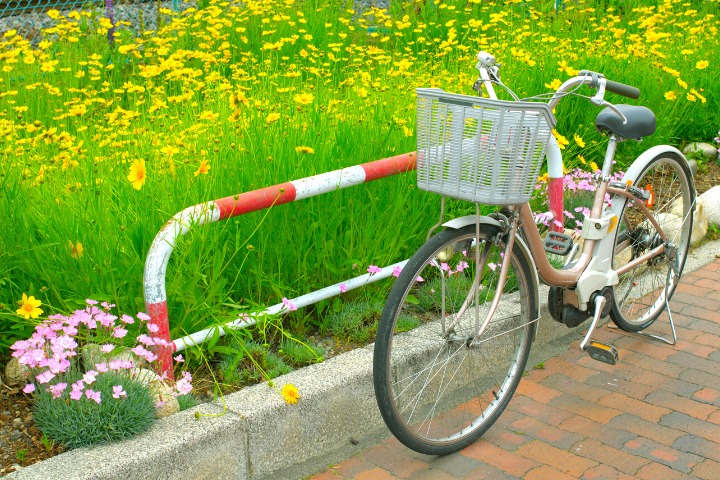Even though public transportation is excellent, cycling in Japan can be a very convenient choice and an easy way to move around neighborhoods without having to hop on a crowded train or constantly check the metro timetable.
If you are thinking about getting a bicycle in Japan, here is what you need to know.
Buying a Bicycle
Brand new bicycles can be purchased directly at local bicycle shops, where you can try them out and get valuable feedback from the staff.
From road bikes and electric bicycles to mama chari, aka “mom’s bicycle” (a light city bicycle equipped with a small basket at the front)—bicycle-friendly Japan offers a wide range of choices, depending on your needs—and fitness level.

Credit: Canva
Where To Buy A Bicycle
Bicycle shops are very common within the city. The range of choice might not be as extensive as it may be online, but you can usually get a better deal and avoid high shipping fees: in general, there are always more benefits to buying in a physical shop than downsides.
Japan is a great country to shop for used equipment—if you feel like looking around at your options, or if you are on a budget, you can always opt for looking up websites such as Yahoo Auctions and Mercari, where you can find amazing deals on used bicycles, but these websites are all in Japanese. Mercari is an e-commerce company where you can buy and sell with “peace of mind”: sellers are verified and previous buyers leave reviews for easy reference. Yahoo! Auctions, on the other hand, runs on an auction-based system: the seller sets up a minimum price and a time frame, and interested buyers bid their offer. The highest bid gest the product at the end of the chosen timeline.
Registering a Bicycle
The first thing you have to do when buying a bicycle is to register it under your name. When buying it new from a shop, the staff should guide you through the process, but if you just buy it used from an acquaintance, you can visit a local bike shop or go to the nearest police station with the registration papers from the previous owner and, for a small processing fee (less than 1000 yen), you can easily get it properly registered. This is crucial for monitoring bicycles and to be able to report to the police in the unlucky case it gets stolen.
Follow Traffic Laws When Cycling
Bicycles are classified as light vehicles, together with motor scooters; therefore, you must remember to comply with the same traffic laws and follow the same rules that apply to motored vehicles. For example, avoid riding on sidewalks, ride in the direction of traffic, do not use your smartphone, or listen to music while riding, as it can impact your concentration.

Credit: Unsplash
Sign Up for Bicycle Liability Insurance
If you live in Tokyo, getting cycling insurance became compulsory in April 2021. Many providers and companies nowadays offer basic bicycle insurance plans, called jitensha hoken (自転車保険) in Japanese, that for just little more than 3000 yen a year give you essential coverage in case you are unlucky and get caught up in an incident that involves either getting injured or injuring someone else. Common convenience store chains such as 7-Eleven and Lawson, but also companies such as Line and Softbank have started providing similar insurance plans, to which you can easily apply online and pay at any convenience store.
Parking Your Bicycle
Parking in the street is almost always prohibited, and bicycles should be parked in authorized areas—bike parking is usually located around most train stations.

Credit: Canva
Parking and locking your bike in the street can be an option for a couple of minutes, for example, when stopping in front of a convenience store, but when leaving it on the street for an extended period of time, it might get seized by the police, and if you want it back you may be subjected to the payment of a fine to the local ward.
Why Not Get on a Bike and Start Cycling in Japan?
Ditch busy and cramped rush-hour trains and switch to a more environmentally friendly means of transportation—cycling in Japan is fun!
Related Articles:
- Basics of Japanese Gym Etiquette
- The Essential Guide to Zero Waste Shopping in Japan
- Why Japanese Take Their Trash Home
- How to Go Cashless In Japan
Featured image credit: Canva






